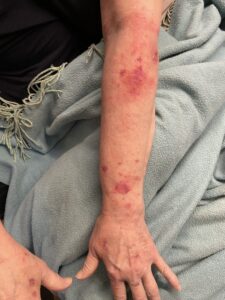If you want to give your character a miserable lifelong disease, give them an autoimmune disease. There are at least a hundred known autoimmune diseases. Some like Sjögren’s won’t shorten their lifespan. Other more serious disorders like lupus and systemic sclerosis can affect survival. I’ve never seen Sjögren’s used either in a novel or movie, although it’s the most common autoimmune disease in women.
I’m becoming a bit of an expert, because I was diagnosed with Sjögren’s a couple of years ago. I knew something “autoimmune” was going on for about fifteen years, but lab tests were vague and not definitive. Autoimmune diseases tend to run in families, and that is certainly true of mine.
Sjögren’s is related to other autoimmune diseases such as rheumatoid arthritis, systemic lupus erythematosus, psoriasis, systemic sclerosis, giant cell arteritis, and sarcoid for example. Its most prominent symptom is dry mouth and dry eyes, along with decreased sweating. (that puts me at greater risk for heat injury such as heatstroke. (See Writing About Hyperthermia)
The disease attacks the glands that make saliva, tears and sweat. Sjögren’s also causes nonspecific pain in the musculoskeletal system (similar to chronic fatigue syndrome), cartilage and bones, along with arthritis in the joints.
Autoimmune diseases attack various tissues in the body, and that difference determines the symptoms your character will suffer. Click To TweetMy most prominent symptom is fatigue. This is true of many other autoimmune diseases. I wake up tired every day, and if bad, remain tired all day. If I have a good day, I can easily overdo it, trying to catch up with the missed day’s work. Which means the next day I feel worse. (P.S. Don’t try to reorganize your office all in one day. Lesson learned!)
Autoimmune diseases are prone to flares from even normal activity, physical or emotional stress, surgery, weather, viruses of any sort, including the common cold. They are particularly flared by exposure to Austere Environments (See Writing about Wilderness Medicine)
Another painful problem is dry mouth and dry lips. Even with mouth lubricants like coconut oil or OTC gels, my mouth gets red and dry. If I have a bad flare, my lips crack and peel like it’s the middle of deep winter. This is called cheilitis, and I should buy stock in a chapstick company.
If you have one autoimmune disorder, you are more likely to develop another. I had Hashimoto thyroiditis in my 40’s and had have my thyroid removed. This year, I developed drug-induced sarcoid from an injectable medication for asthma, which had to be stopped. The sarcoid thankfully is resolving after several months of that medicine.
Sjögren’s typically shows up in middle age, but diagnosis is delayed for about seven years because symptoms are vague and confused with other illnesses. Click To Tweet
My dentist and eye doctor had complained about my dry mouth and eyes for a decade. (Yet I missed the diagnosis. DUH) My salivary glands seemed swollen, but then I have bad allergies. It’s also hard to tell lymph nodes from glands sometimes. That’s my excuse, anyway.
I bruise easily due to the skin changes, which can be noticeable since it’s on my hands and arms. Even when I wear gloves to work around the house, I bruise. The spots drive me nuts because so many people comment on them. “No, I don’t have leukemia.”
One thing as an author you should address in your novel is how often a patient has to go to the doctor. At times, I’ve had three appointments in a week—and if you’re a writer, it hampers your schedule.
A lot.
It’s going to mess with your character’s schedule, too!
Questions to ask if Writing about Sjogren’s disease:
- What age and sex is your character? Sjögren’s is rare under age 30. The most common age for presentation is over age 50. I was in my 60’s, but I’d had symptoms for 15 years. The disease is more common in women than men.
- In what physical ways do you want to limit my character, and why? Joint pain, tendon pain, and tenderness can be part of this disease. It’s similar to fibromyalgia, but not the same.
- What treatments do you want your character(s) to undergo? Sjögren’s is treated symptomatically with a variety of medications to stimulate saliva and tears. Worsening may require steroids such as prednisone. Bummer of a drug to be on. Steroids makes you feel better but then you’re hungry all the time. They cause weight gain, makes skin more fragile, give the patient a rounded moon face, and a “buffalo hump” on the back of their neck.
Some Sjögren’s patients require stronger medication like hydroxychloroquine or methotrexate, which is chemotherapy. Newer injectable drugs coming out for other autoimmune diseases are being studied for Sjögren’s, but none are yet FDA-approved.
- How will my character respond to a chronic illness? For example, depression and anxiety are frequent. I’m not depressed, but I sure get frustrated and impatient. Others, however, accept things with patience and grace.
- Did your character have a family member with Sjögren’s or another autoimmune disease? My grandfather had rheumatoid arthritis, as did two of his sisters. Two uncles on that had it as well. Multiple cousins have had lupus, rheumatoid or a mix of both.
- Is your character a get-up-and-go person who has to alter their life, or can someone who is passive find the strength to fight the illness and start exercising? Think of all the creative ways a character can respond.

Me? I’m a go-getter who hates the unpredictable nature of this disease.
- How will the character’s Sjögren’s affect family members, boss, coworkers, children, neighbors and others who interact with them? More care is required by family members, and a lot more patience and understanding. I may set up a lunch with a friend and have to cancel at the last minute. My grandson has learned grandma gets tired easily when we go to the swimming pool.
- Is your character patient, impatient, obnoxious, or belittling? A lot of drama can be squeezed from a chronic illness because of its unpredictability.
- Where will the character’s doctors be? Near or far? Are they understanding or aloof? Sjögren’s is typically cared for by rheumatologists, but other doctors need to be involved. At least one male physician, an internist, implied my symptoms and the pain were in my head. He was wrong.
- Will the character seek out a support group or go it alone? I’m a loner-type, but I’m unusual because I’m a patient/doctor. Patients without a medical background are more likely to seek out group help for more information. If a patient doesn’t have strong family support, groups can especially be helpful.
- How often do you want them to see a medical professional? Proper dental and eyecare are crucial, and may need more than the average 1-2 visits per year. Doctors who specialize in other organs such as the lungs, heart and kidneys may end up being consulted. A dermatologist is needed for dry skin issues. I have weeks where I may have three doctor visits. Eye care by an ophthalmologist is important depending on the medications, as some can cause retinal damage.
- What is your character’s occupation? Someone with Sjogren’s would continue to do fine in an office setting, but would find working at a construction company difficult. Due to the unpredictable nature of fatigue and flares, I would have problems seeing patients in a clinic or office now. Is your character a CEO of a Fortune 500 company? Autoimmune diseases would play major havoc with keeping that job. The stress of the position alone would pose problems.
PHOTOSENSITIVITY REACTION
 So this was a fun thing called a photosensitivity reaction. On vacation in the mountains, while taking the drug Plaquenil, I didn’t think I needed sunscreen. It was late fall, we were far north, and it rained EVERY DAY. Not much sun! Somehow I still got enough sun to provoke this exquisitely itchy reaction, which needed Benadryl, steroid creams, and yes, prednisone pills to settle it down.
So this was a fun thing called a photosensitivity reaction. On vacation in the mountains, while taking the drug Plaquenil, I didn’t think I needed sunscreen. It was late fall, we were far north, and it rained EVERY DAY. Not much sun! Somehow I still got enough sun to provoke this exquisitely itchy reaction, which needed Benadryl, steroid creams, and yes, prednisone pills to settle it down.
Like I said, it can be a miserable disease!
Deeper Dives:
https://www.mayoclinic.org/diseases-conditions/sjogrens-syndrome/symptoms-causes/syc-20353216
https://my.clevelandclinic.org/health/diseases/4929-sjogrens-syndrome
https://my.clevelandclinic.org/health/diseases/21624-autoimmune-diseases
https://www.medicalnewstoday.com/articles/list-of-autoimmune-diseases

